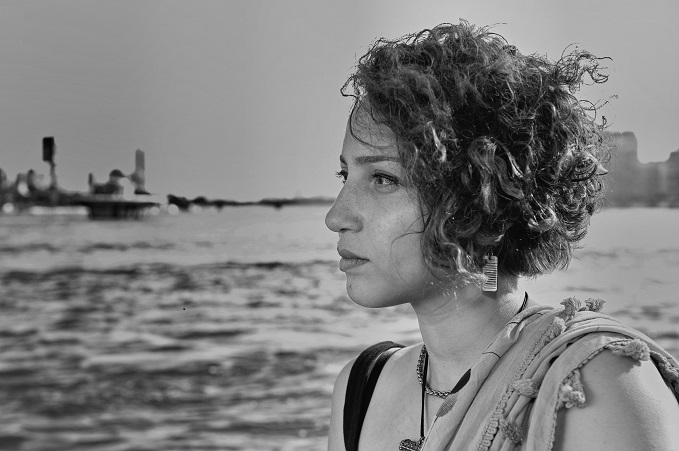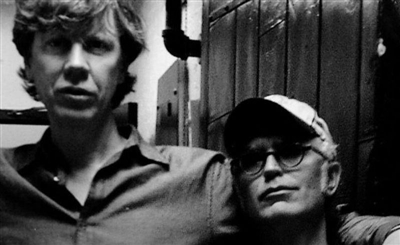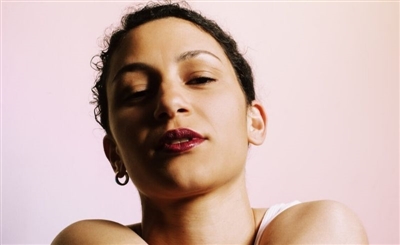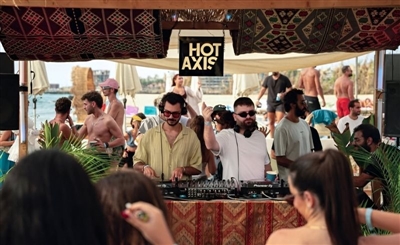Maryam Saleh: A Musical Nebula
Ahead of the release of her upcoming album, Halawella, set to drop this month, Eihab Boraie sits down with musical supernova and acting sensation Maryam Saleh to talk early inspiration, pushing boundaries, and refusal to be pigeon-holed.

Those with souls know how enriching and impactful music can be on a life in search of fulfilment. Its waves ripple into our brains and have the power to control our entire nervous system. Its infinitely diverse universe of sounds can make us laugh, cry, dance, and even rebel. Somewhere in that universe you will find Egyptian artist Maryam Saleh searching for inspiration and broadcasting her signature style. With a new album set to be released on Sept 17th, I decided to meet up with this multi-talented artist to find out what the musical galaxy should expect.
Maryam Saleh is a musical soul raised in a musical house in a not so distant musically vibrant Kahira. As a child, Saleh was spoiled by a wide array of musicians coming in and out of her house, igniting a passion for the arts from an early age. “My mother was a singer and had a lot of musical friends who filled our house with beautiful sounds. My choice to sing wasn’t random, it was something I grew up with and knew I would do when I got older,” passionately explains Saleh. Growing up understanding the power music has over shaping thoughts and identity, Saleh ignored the pop singers polluting the mainstream and decided to channel the controversial sound of working class cult hero Sheikh Imam Mohammad Ahmad Eissa. According to Saleh, “When I turned 16 I decided to form a band named Gawaz Safar to cover my favourite Sheikh Imam songs. He was banned from singing and his music wasn’t released on cassettes. My goal was to sing his songs publicly - it almost felt like a political decision, but I wanted to expose friends and music lovers to his inspiring works and put together a tribute concert in his honour.”
Sheikh Imam is arguably one of the first underground folk artists to emerge in Egypt. Blinded at the age of five, this inspirational musical prodigy didn’t let his disability stop him from making music, and sang a message which rung true for the underprivileged in society while enraging the ruling class. Teaming up in 1962 with legendary Egyptian poet Ahmed Fouad Negm, the duo began composing political songs that were instantly banned from radio and television and resulted in their imprisonment on multiple occasions. Unable to perform in his home country Sheikh Imam built a career in the mid 80’s playing abroad in major musical hubs like France, Britain, as well as across the Middle East. While most Egyptians of the time were listening to budding artists like Amr Diab, Saleh instead researched alternative sounds that dared to challenge the status quo, which is what drew her to Sheikh Imam’s work.
Resurrecting his work, Saleh’s interpretation of the revolutionary icon was well received and gave her the boost of confidence needed to courageously set out to release an album under her own name entitled Ana Mesh Baghany. Talking about her debut album Saleh tells me that “It was the first album I worked on under my own name instead of hiding behind a band or collaboration. All the music in this album was composed by me except for two songs composed by musical director Tamer Abu Ghazaleh. It was an important album for me because it was my introduction to the musical world and documents my development as an artist.” Ana Mesh Baghany was released by Eka3 record label, and was praised as a successful introduction to Saleh’s work with tracks reaching over a 200k+ views YouTube. Furthermore, the album found success in television as tracks were used in the soundtrack of a Ramadan TV series entitled Farah Leila. “I felt somewhat scared when the album had the opportunity to be taken as sound track in a Ramadan TV series. They ended up using most of the songs in the series, which is a lot more exposure than the kind of success that most underground artists get. I was a little bit scared that this would put me in particular frame as an artist and I don’t like to be framed,” admits Saleh.

To avoid being labeled or framed as a singular genre singer, Saleh continues to expand her musical horizons moving from Sheikh Imam inspired Folk into variety of sounds ranging from Hip Hop to Electro Pop. “When I create a song I do a lot of research looking for new sounds and attempting to share a feeling that most people experience. I tend to search for humour in misery, creating lyrics fitting for a dark comedy.”
Looking to build on the success of her debut album, Mostakell records (a label under Eka3 platform) will be supporting her latest release, Halawella, which will explore new musical territories with a different collaborator, influential Lebanese artist Zeid Hamdan. According to Saleh, “I met Zeid when he was touring with a band called Kaza Mada. At the after party in Alexandria, I began singing with some friends, but I believe Zeid had already gone to bed as he usually sleeps early. Overhearing us singing, Zeid returned joining in with a tambourine and afterwards asked me to record songs with him.” The dynamic duo returned to Cairo and recorded three songs and a video in Alex before Zeid returned to Lebanon. Despite being able to record from scratch in a day, the album would take four years before being completed.
A large reason the album has taken years to make, is due to the hectic schedule of both Saleh and Hamdan. Arguably one of the hardest working musicians in Lebanon, Zeid Hamdan always has something coming out, working with over a dozen outfits across the Arab world and supporting each release with a tour. During that same time, Saleh found herself building the reputation as a successful actress, appearing in television and movies. “I have worked on multiple film projects. I was in Ibrahim Batout’s Ain Shams, Osama Fawzi’s Bel2lwan el Tabe3yah, among other shorts. I was also in the Ramadan TV series Farah Leila starring Leila Elwy, which used most of the songs from Ana Mesh Baghany. The latest film project I took part in is the yet to be released; Akher Ayam el Madina directed by Tamer El Saeed. What people don’t know is that I like to assist behind the scenes as a stylist or director’s assistant a lot more than appearing in front of the camera,” confesses Saleh.

With Halawella set to be released on September 17th, both Maryam & Zeid have put other projects on hold to focus on promoting their new album. Attempting to create buzz ahead of its release Maryam & Zeid have just returned from a mini-European tour and are putting together a regional tour to support their latest effort. Saleh’s raw folk rooted vocals perfectly blend with Hamdan’s ability to arrange interesting Electro Pop beats and should result in an album that diversifies from her debut effort. Saleh is indeed a multi-dimensional star in-the-making, adding colour and Arabian sounds to a musical galaxy in desperate need to fill its spatial void.
To follow the latest on the album release click here.
Photography by Khaled Habib
Shot on location at Sofitel Gezirah
- Previous Article Getting Abyusif
- Next Article DGTL: Much More than a Music Festival
Trending This Month
-
Jan 29, 2026






















